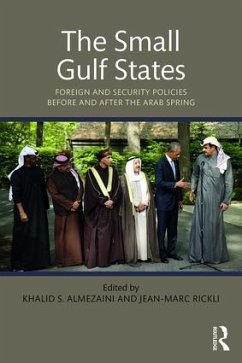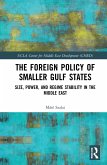Small states are often believed to have been resigned to the margins of international politics. However, the recent increase in the number of small states has increased their influence and forced the international community to incorporate some of them into the global governance system. This is particularly evident in the Middle East where small Gulf states have played an important role in the changing dynamics of the region in the last decade.
The Small Gulf States analyses the evolution of these states' foreign and security policies since the Arab Spring. With particular focus on Oman, Qatar and the United Arab Emirates, it explores how these states have been successful in not only guaranteeing their survival, but also in increasing their influence in the region. It then discusses the security dilemmas small states face, and suggests a multitude of foreign and security policy options, ranging from autonomy to influence, in order to deal with this. The book also looks at the influence of regional and international actors on the policies of these countries. It concludes with a discussion of the peculiarities and contributions of the Gulf states for the study of small states' foreign and security policies in general.
Providing a comprehensive and up-to-date analysis of the unique foreign and security policies of the states of the Gulf Cooperation Council (GCC) before and after the Arab Spring, this book will be a valuable resource for students and scholars of Middle East studies, foreign policy and international relations.
Hinweis: Dieser Artikel kann nur an eine deutsche Lieferadresse ausgeliefert werden.
The Small Gulf States analyses the evolution of these states' foreign and security policies since the Arab Spring. With particular focus on Oman, Qatar and the United Arab Emirates, it explores how these states have been successful in not only guaranteeing their survival, but also in increasing their influence in the region. It then discusses the security dilemmas small states face, and suggests a multitude of foreign and security policy options, ranging from autonomy to influence, in order to deal with this. The book also looks at the influence of regional and international actors on the policies of these countries. It concludes with a discussion of the peculiarities and contributions of the Gulf states for the study of small states' foreign and security policies in general.
Providing a comprehensive and up-to-date analysis of the unique foreign and security policies of the states of the Gulf Cooperation Council (GCC) before and after the Arab Spring, this book will be a valuable resource for students and scholars of Middle East studies, foreign policy and international relations.
Hinweis: Dieser Artikel kann nur an eine deutsche Lieferadresse ausgeliefert werden.
This edited collection on the smaller Gulf Cooperation Council countries' international relations shows that small is not a barrier to ambition or performance. Indeed, smallness - for all the images of vulnerability that it conjures up is also an asset when it comes to policy nimbleness. Furthermore, the authors in this volume also show that smallness rarely inhibits policy choices. The cases of Oman, Qatar and the UAE on which the collection focuses illustrate fully the flexibility that comes with small size. But the authors also draw attention to the barriers that a small state cannot, by itself at least overcome. Theoretically rich, the editors chart a new ways in which we can analyse the conduct of small states in the international arena. Anoush Ehteshami, Professor of International Relations and Director of the HH Sheikh Nasser al-Mohammad al-Sabah Programme at Durham University.








